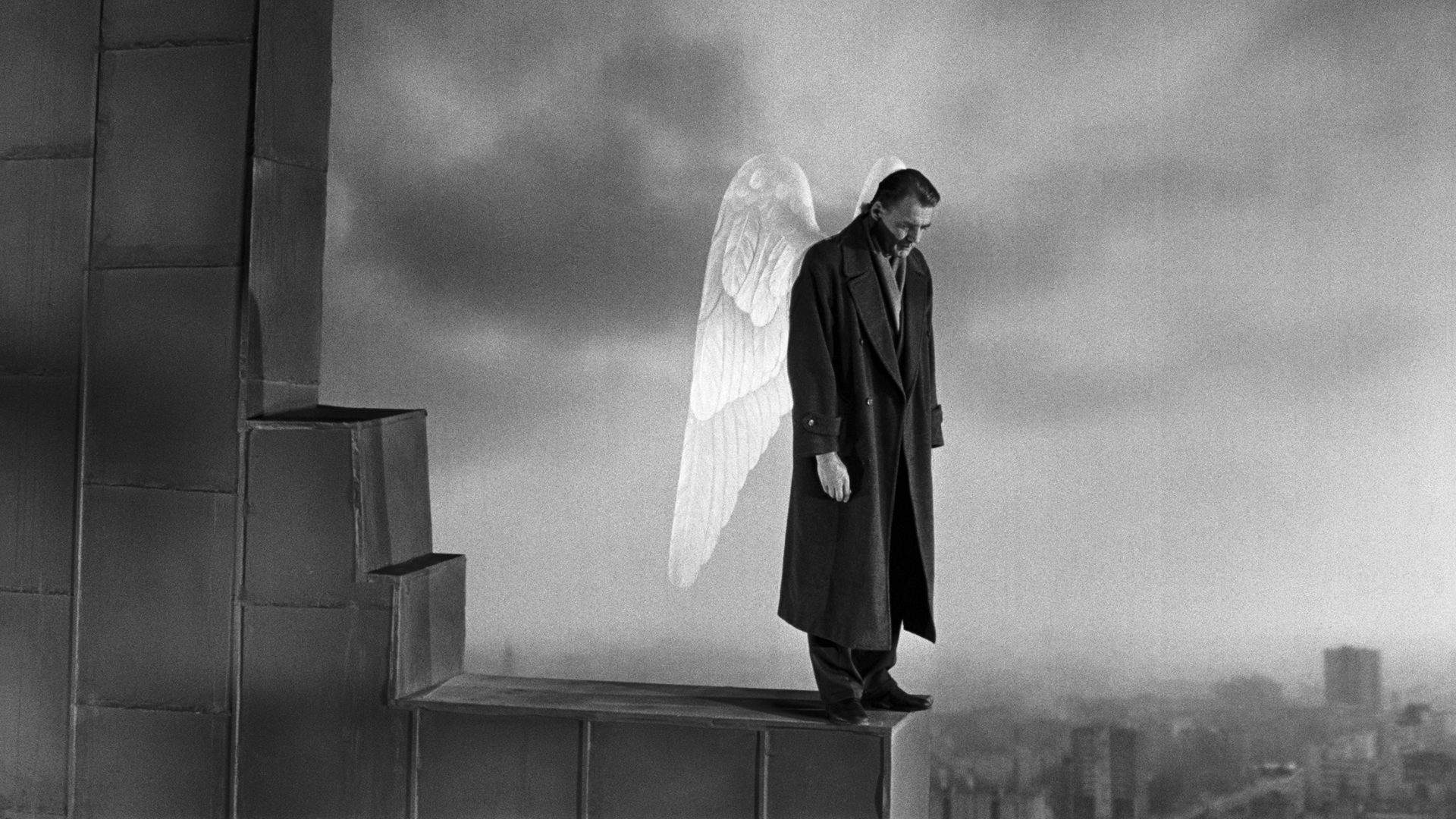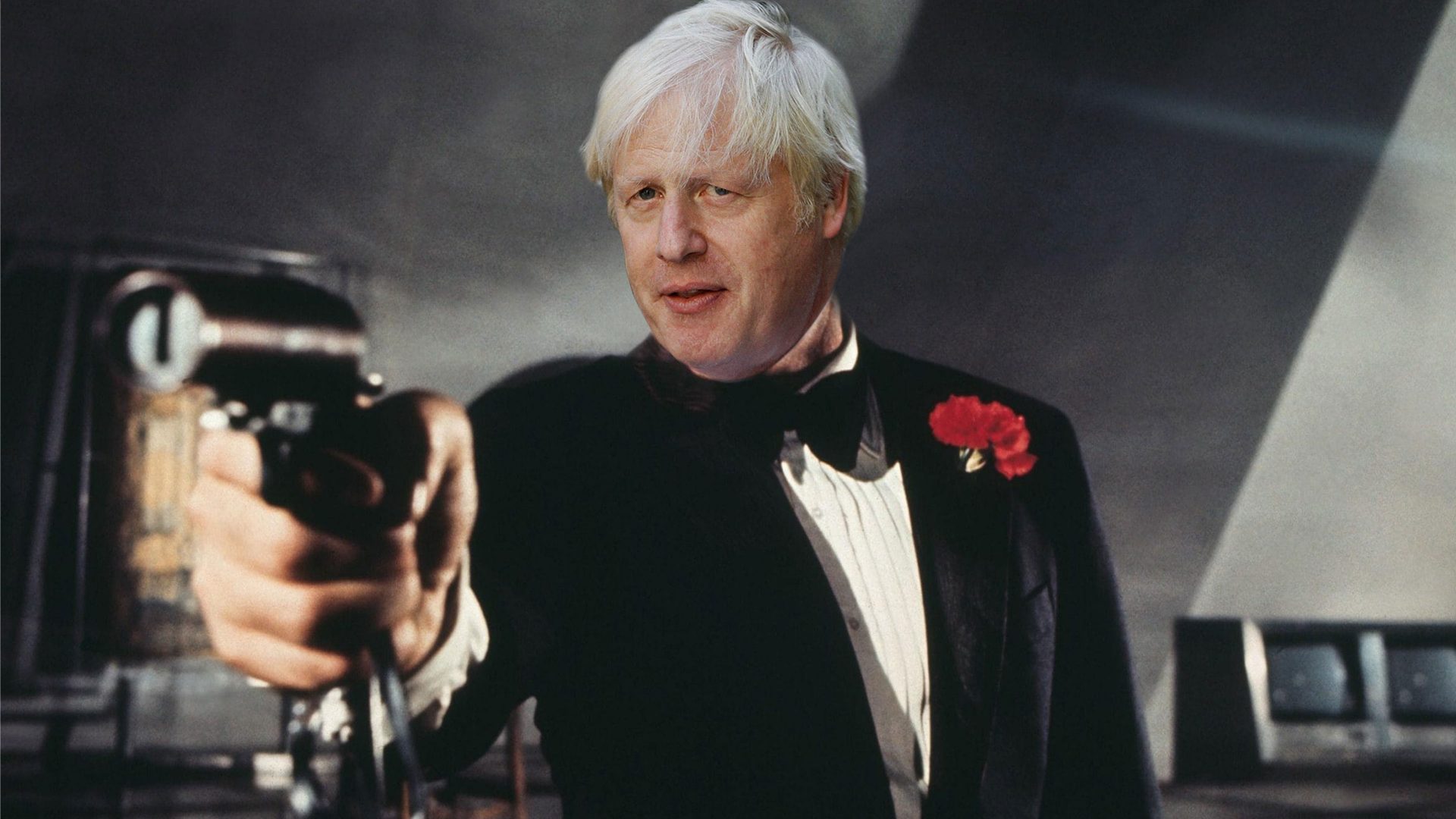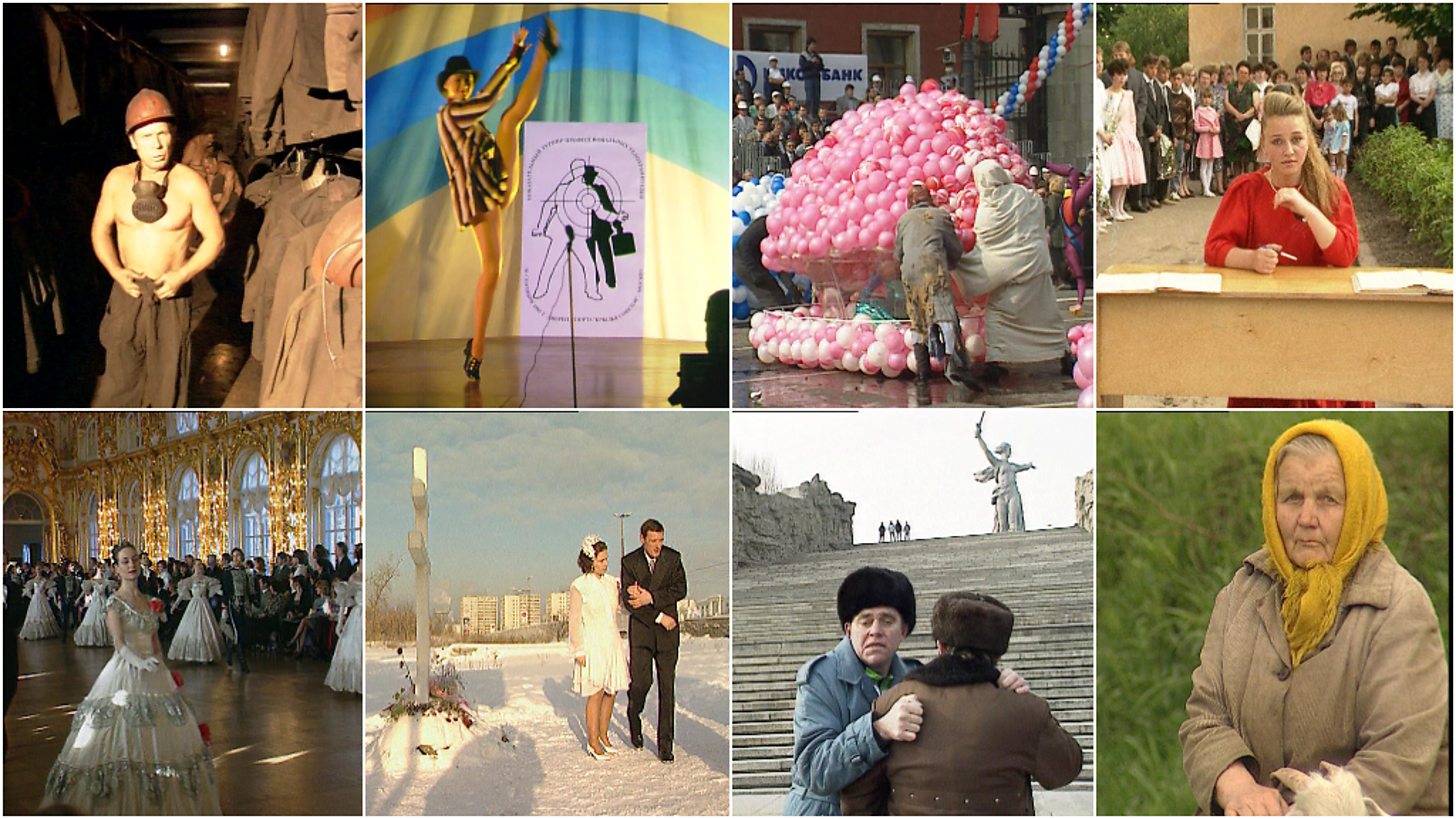Wim Wenders had had enough of America by the mid-1980s. Sure, his time there had yielded the wonderful Paris, Texas and his documentary Lightning Over Water afforded him plenty of time to hang out with his filmmaking hero Nicholas Ray. However, when the studio insisted he almost entirely reshoot his crime drama Hammett, the Düsseldorf director knew it was time to fly back to the fatherland.
Long obsessed with Berlin (“a land-locked island city”), Wenders dedicated himself to making a picture there. And influenced by the city’s angelic public art and the poetry of Rainer Maria Rilke, he decided that his picture would focus on the angels who invisibly walk among the city folk, observing their struggle and, on occasion, relieving their pain.
It was all a very long way from The American Friend and The Goalkeeper’s Fear of the Penalty. If his move into magic realism was a surprise, Wenders had the perfect collaborators with whom to pull off this artistic coup. With future great Claire Denis as his assistant director, the legendary Henri Alekan behind the camera and future Nobel prize-winner Peter Handke joining him on screenwriting duties, our man’s backstage crew was pretty damn close to an a-team.
And in front of camera, he had a clutch of Europe’s finest performers. Bruno Ganz, Curt Bois, Otto Sander – actors to conjure with. Throw newcomer Solveig Dommartin into the mix together with free radicals Peter Falk and Nick Cave, and this was a cast like no other.
The film Wenders came away premiered in West Berlin 35 years ago this week. Today, it stands apart from both his and everyone else’s work. There was a sequel (Faraway, So Close!) and an American remake (City of Angels), but Wings of Desire easily overshadows both.
In the years since it was made, Berlin has changed beyond all recognition. And so has the world. No matter what the future has in store, there will be a place on high for Wings of Desire, a picture that saw a cynical filmmaker embrace something essential: hope. Here, in their own words, is how Wenders and his collaborators made it.
Wim Wenders (director/screenwriter/producer): “I missed my own language. [In America] I was starting to dream in English and realised that wasn’t a good thing to happen to me. So I started to read more in my own language, and what I consider the most beautiful German are the poems by Rainer Maria Rilke. Seen from the US, I really wanted to go back to Europe, and from all the possible cities I picked Berlin, which was the city closest to my heart.”
Claire Denis (first assistant director): “The Berlin of the mid-1980s was a very different place. An alien landscape.”
Wim Wenders: “Berlin’s a unique place. There’s so much history and, at the same time, so many open wounds. Berlin was one of the cities that still showed its wounds. Most other German cities were rebuilt [after the war] and had no traces of the past left. My own city, Düsseldorf, had been destroyed by 80%. You couldn’t see the past anymore. And as Berlin was divided, it was also showing the state of the world. There was still a cold war. Berlin was, in a strange way, the centre of the world – a little miserable sometimes but, at the same time, an island for amazing people from all over the world. Even some crazy punks from Australia decided it was a great place.”
Nick Cave (actor, Self): “In Berlin, we were welcomed into this incredible kind of nocturnal world that seemed to be populated by people who were
alienated in the same way that we were. You were allowed to venture into
your own madness. Everything was acceptable. Extreme behaviour was
encouraged. It was a madhouse, that thing where the inmates had taken
over the madhouse.”
Wim Wenders: “There were lots of musicians, painters and writers. It was
quite a free city; also a city without arms. In Berlin you couldn’t have any
arms; you couldn’t get in and out of the city with them. There was not much
violence in Berlin then. It was a very peaceful city.”
Claire Denis: “I was very interested in his trust and the belief that film is something you have to look for. We know it costs money and it has to happen, but every morning and every night, there is a search for it.”
Wim Wenders: “As I walked around Berlin, I saw angels all over, as monuments or sculptures or reliefs in public places, more than in any other city. I was really looking for a story that could help me to tell the city’s story. I was looking for a character through whom I could tell the city’s story the best. Eventually, my night reading being populated by angels, and the angels I photographed and encountered all over the city, led me to the realisation that I wouldn’t find any better characters for my project. So I started to come up with a story that had guardian angels as protagonists.”
Peter Falk (actor, Der Filmstar): “I’m no angel. Except when I’m in Wim’s movies. When I’m working on his films, I’m an angel both on and off screen.”
Wim Wenders: “The more I thought about it, the more I thought I was
crazy. “You want to make a movie with angels!?” But the idea opened so many possibilities to look into so many different lives, because these angels
could be anywhere. They could cross the Wall. They could meet anybody and be perfect witnesses of life in Berlin. I finally had a point of view that was all-encompassing. Not that I really believed in angels, but I liked them as a metaphor.”
Leigh Singer (critic, BFI): “Remember, the film’s original title is Der Himmel
über Berlin – The Sky Or Heavens Over Berlin – and the project began as an
investigation into Germany’s then-divided city. Its angels were only brought in as an inspired afterthought.”
Bruno Ganz (actor, Damiel): “One of the main problems we had in making Wings of Desire was: how do you play an angel? Usually you play a character and then you think psychologically and you ask yourself: ‘What is this guy like? What is he feeling, and what is he thinking?’ Now this is a problem when you are playing an angel. What can you do? You can try to walk as though you could fly, and otherwise, you are yourself, because you can’t do anything. You are just there. I mean, there is just no acting. What you deliver is your physical presence. That’s it. There’s no possibility for psychological problems among angels. And that was really a kind of problem for us.”
Claire Denis: “I was with Wim throughout the casting process. In particular, I remember I was with him when we hit on the idea of casting Peter Falk. That was an idea right out of leftfield. But we were both very taken with it.”
Wim Wenders: “I said to Claire: ‘Do you realise our movie is not really funny? Angels being what they are, they’re not really comedians. We have nobody who’s going to make this a little more amusing. Don’t you think we have to add a character?’ She said: ‘Yeah.’ And I said: ‘Well, don’t you think the most fun would be if there was somebody who was an ex-angel and had the same experience that Damiel was having?’ I thought, wouldn’t that make the whole film less serious?”
Peter Falk: “The phone rang late one night. The call was from Germany. Between a poor connection and a slight accent I didn’t catch the name. It
appeared that he was calling regarding a script he was involved with – regarding a part he wants me to play. He spoke about [Falk’s regular collaborator] John Cassavetes. He wasn’t merely familiar with John; he’s
knowledgeable on a truly meaningful level.”
Claire Denis: “If we had a piece of luck it was that Peter had seen Paris, Texas, and thought it was the best movie he’d seen for a very long time.”
Peter Falk: “[It came] to me from out of the blue. He’s the director of Paris, Texas! I’m now asking specifics about my part – what does my character do,
how does he make a living… Wim’s only sure of one thing – the character is an ‘ex-angel’. Now, I’ve heard of ex-wives. I’ve heard of ex-convicts, but I’ve never heard of an ex-angel. I’m hooked!”
Bruno Ganz: “I sometimes had the feeling that I was doing something extraordinary, and at certain moments even celestial.”
Wim Wenders: “Nick Cave was a kind of local hero in Berlin at the beginning of the 1980s. To me, he is not only a great singer but also a very gifted poet.”
Nick Cave: “I’m a musician and I’m a writer and I have these occupations to
take up most of my time. I’m not a struggling actor, so I can look at film roles and I can easily throw them away. If something particularly interesting comes my way, I’ll do it. Like Wings of Desire.”
Leigh Singer: “Wim Wenders brought legendary cinematographer Henri Alekan out of retirement to shoot Wings of Desire. Alekan used a silk stocking as a filter for his textured, sepia-tinged black-and-white imagery, depicting the angels’ muted vision of the world.”
Bruno Ganz: “The way Wim works is far away from industrial film. He invents the film while shooting… which costs a lot of money, a lot of material. He takes risks. But he is his own producer so he can afford it, although I think he had to sell his father’s house when we did The American Friend. And he’s been a gambler. There is a ‘poker player’ side to him. You wouldn’t think so, because he has always given the impression of being a fragile artist, but there is a hard side to him as well. In making films with other directors, my respect for Wim Wenders increases constantly because it is a matter of creating something together. He invents a film while shooting. That’s amazing. Nobody else does that.”
Wim Wenders: “When I first started directing and for many years after, I hated having to follow a script. I’d see some fantastic location… I wanted so
badly to shoot it. The same for a sudden fresh impulse for a new scene. So I hated scripts. They cramped me. They were like a jail. On Wings of Desire, I didn’t have a script. And every night before I went to sleep, I’d pray to God: ‘If I only had a script!’”
Nick Cave: “I think me and Wim tend to share a very romanticised view of
things. We tend to take the environments we’re in and look at them from an outsider’s perspective.”
Wim Wenders: I don’t know where else Nick Cave could have lived except Berlin at that time. He was the reigning King of Darkness in Berlin, of all the dark and grungy places he would show up at late at night. Nick Cave and the Bad Seeds were the underground heroes. People dressed like Nick, people spoke like Nick.”
Nick Cave: “I’m very pleased something of that period was captured on film. And very pleased that Wim was the person who captured it in the way that he captured it.”
Peter Falk: “I love Wim. He’s wide open. He’s not anxious, not fearful. If something tickles or interests him, he’ll go for it. He’s similar to Cassavetes. Real loose.”
Claire Denis: “Peter so enjoyed his time on Wings of Desire, he wouldn’t go home. A week after he’d wrapped, he was still in Berlin, touring the bars and
the cafés.”
Peter Falk: “Wings of Desire’s often told through the unspoken thoughts of the
characters. On my last day, there was a little going-away party. As I headed down the corridor to the elevator I heard my name called – ‘Peter! Peter, wait!’ It was Wim running after me: ‘I forgot the interior thoughts!’ So they put me in a room for two hours. I talked and they recorded. Wim was pleased and I got on the plane. Six months later, I’m 15,000 feet above sea level in the Andes shooting a movie in a small Incan village when I get a message to call Wim. It turns out that when I recorded my thoughts, the sound was bad. Ten days later, in Los Angeles, I record my interior thoughts again – a second time. And that’s what’s in the film. And I liked them, liked what Wim did with them, thought they worked nicely.”
Wim Wenders: “We had to rebuild the Berlin Wall sets after they got wet. Cardboard had been used in their construction and once the rain got to it, it started to warp. So this short time before the Berlin Wall came down, we had to put it up! Twice!”
Peter Falk: “It never occurred to me that Wings of Desire would play in the US. I was wrong, and thank the Lord for it. It not only played here, it was immensely successful. I can’t tell you how many people were affected and delighted by it.”
Bruno Ganz: “The only surprise with the film was that I was happy with [my
acting in] it. I thought: ‘that’s good work, not bad at all’. Because often, when you see a film you have just shot, you say to yourself: ‘Oh, what was I doing there? Oh, what a mess!’ No, in that case, I was rather relieved. But what really touched me was that, for several months after the film came out, when people – especially women – recognised me, their eyes opened wide and they said: ‘It’s the guardian angel’… as though they actually took me for an angel. And people in planes said: ‘Ah, no need to be afraid, because with you here, nothing can happen. Now we are safe.’”
Claire Denis: “Wings of Desire was my last film working with Wim as assistant director. By the time he made the sequel, Faraway, So Close!, I was directing my own features.”
Bruno Ganz: “Faraway, So Close!… I know I should not say this, but I think the script was really horrible. There’s too much in it. All this arms traffic and
weapons smuggling, this Russian Mafia story, and then back to Hitler for 20 minutes, I didn’t like that…”
Leigh Singer: “Few modern films have made the transition to classic status as quickly as Wings of Desire. It swept up highbrow critics alongside a much larger mainstream audience than was typical for ‘challenging’ foreign-language cinema of the day. Premiere’s 1980s wrap-up poll voted it second only to Raging Bull.”
Wim Wenders: “A film like Wings of Desire, if it came out today, would not
have a chance. It would disappear. Even at the time, it needed time. It eventually became a classic, if I may say so, but it needed time.”
Sources: Beyond Columbo by Richard A Lertzman and William J Birnes, Just One More Thing by Peter Falk, The Logic of Images by Wim Wenders, The South Bank Show: Nick Cave, Motion and Emotion: The Films of Wim Wenders, Cahiers du Cinema, Interview, Film Quarterly, Filmmaker, Neon, POV, Sight & Sound.
A remastered version of Wings of Desire is available to stream at
homecinema.curzon.com/film/wings-of-desire and the Blu-ray boxset Wim
Wenders: A Curzon Collection is currently available for pre-order



